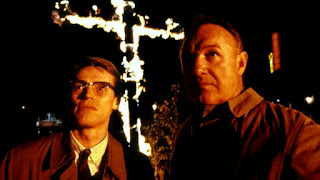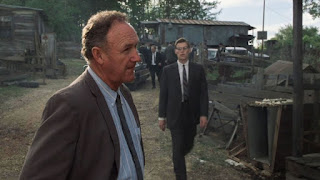In 1964, three civil rights activists (two whites and one black) advocating for black voter registration are shot and killed in Jessup County, Mississippi. Initially only aware that the men are missing, the FBI send agent-in-charge Alan Ward (Willem Dafoe) and veteran agent Rupert Anderson (Gene Hackman) to investigate. Ward is urbane, young and idealistic; the grizzled Anderson is originally from the south, and the two men disagree about almost everything.
Ward and Anderson immediately clash with Sheriff Ray Stuckey (Gailard Sartain) and his Deputy Sheriff Clinton Pell (Brad Dourif), who are both racists and friendly with local Ku Klux Klan leader Clayton Townley (Stephen Tobolowsky) and his chief goon Frank Bailey (Michael Rooker). Ward calls for support from more FBI agents, creating a media storm, infuriating Mayor Tilman (R. Lee Ermey), and increasing arson and violence against blacks in the community. With the locals stonewalling the investigation, Anderson attempts to get close to Pell's wife (Frances McDormand), who may hold key information about the missing men.
A deep dive into a boiling cauldron, Mississippi Burning explores the naked face of racism, not only alive and well but also in control of civic institutions. Loosely based on the murders of activists James Chaney, Andrew Goodman, and Michael Schwerner, director Alan Parker and writer Chris Gerolmo craft a gorgeous-looking and soulful drama, an ironically beautiful portrait of nefariousness.The elegant cinematography by Peter Biziou majestically captures a rustic setting of dusty roads, rural backwoods, dilapidating structures, and remote swamps stuck in time. Against this backdrop the excellent cast shines, Gene Hackman a particular joy as a seen-it-all agent deploying charismatic old-school methods to shake up the inhabitants of a gutter. Frances McDormand also stands out in a fragile role as the one local who may represent a path to enlightenment.
Beyond the rampant racism, the film finds enormous power from a tension-is-everywhere ethos. The locals resent the intrusion of the suited FBI agents. Ward and Anderson are at each other's throats, sometime literally. Secrets reside in the walls at Deputy Pell's household. Black community members are intimidated into silence. Churches and homes are firebombed, as the endless investigation causes tempers to boil over. And with Anderson's prodding, fissures eventually develop among the Klan members.
The film is not without faults. The narrative focusses only on white characters (as both heroes and bad guys), with the black community respectfully represented but confined to the background without a single prominent role. The three victims are also short-changed, and in fact barely named. And the final third, while still inspired by real events, leans towards gung-ho investigative tactics as a pressure relief valve to wrap up proceedings.
But Mississippi Burning glows brightly where it matters most, exposing the inhumane consequences of emboldened rot nurtured by poverty and ignorance.
All Ace Black Movie Blog reviews are here.




No comments:
Post a Comment
We welcome reader comments about this post.